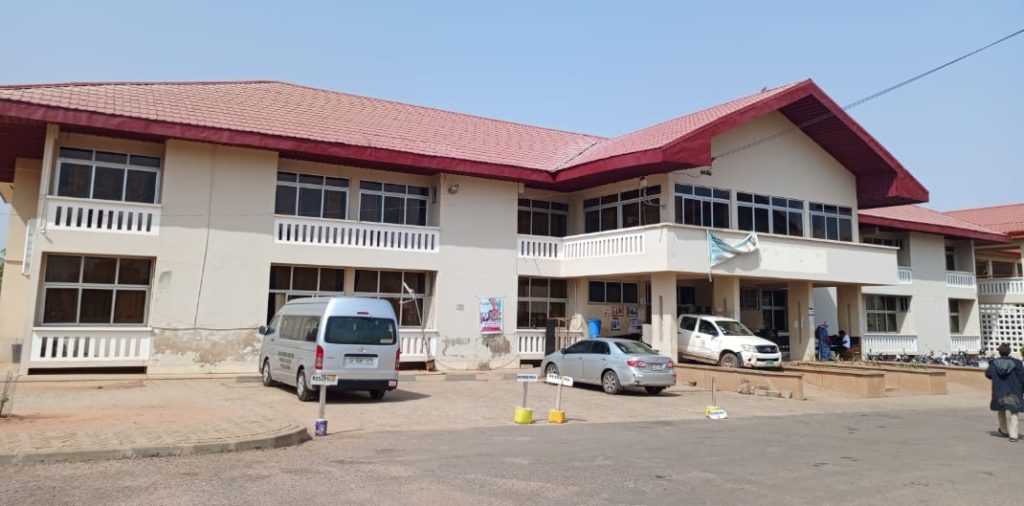By Godfred A. Polkuu
Bolgatanga, Dec. 31, GNA – Health staff working at the Upper East Regional hospital in Bolgatanga have appealed to the Regional Director of Health Service to post more nursing staff to the facility to augment the under staff situation.
In a statement to the Ghana News Agency (GNA) in Bolgatanga, the Hospital staff indicated that “The current staff strength was woefully inadequate for the smooth and safe running of the Hospital.”
The staff compared the situation to some District Hospitals in the Region, saying, “Six different Surgical Specialists in the Hospital’s main theatre work with only nine nurses. Strangely, and without a Surgeon, the Bongo District Hospital has 17 nurses working at the theatre and that of the War Memorial Hospital in Navrongo with one Surgeon, working with 12 nurses.
“This shortage of nursing staff at the Regional Hospital theatre is reflected across the 26 clinical units/wards of the facility. The Regional Hospital currently requires an additional 200 Registered General Nurses to adequately deliver safe and quality patient care,” the statement added.
They unanimously accused the management of the Directorate of not paying attention to their request for more staff, even though the Hospital’s management had reported the situation to the leadership of the regional Directorate for redress.
“In the current posting of nurses and midwives, only nine out of 220 Enrolled and General Nurses reported at the Regional Health Directorate have been posted to the Regional Hospital.
“While there is currently a severe nursing staff shortage at the Regional Hospital, the Directorate, per a letter dated 19th December, 2024, has posted seven nurses to the Bolgatanga Municipality to wait for the start of the new Maternity and Child Health facility that is yet to be equipped at Sumbrungu,” the statement said.
The staff noted that the preventable shortage resulted in reduced quality patient care, delays in treatment and procedures, compromised patient safety, and increased workload, and burnout for the few staff.
When the GNA contacted Dr Samuel Kwabena Boakye-Boateng, the Regional Director of the Ghana Health Service for his response, he said, “We are committed to work with management of the Regional hospital to make sure that the staff strength is improved.”
He emphasised that, “in terms of getting staff for the Regional Hospital, it is a project in itself that sits with me, my team and the Regional hospital team.”
According to him, “generally, across the Region, the Regional Hospital has the best staff norm because everyone wants to work at the Regional hospital or the Bolga Municipal Health Directorate.”
He acknowledged that even though more nurses were needed to operate the additional specialized units following the hospital’s expansion, “That does not mean that we should take all the nurses from the other hospitals for the Regional Hospital.
“So, as far as I am concerned, I will not say the staff situation there is the best, but it is good. The issue is how they manage the staff,” the Director said.
On posting nine out of 220 newly recruited nurses to the Hospital, the Director explained that 200 out of the number were Enrolled Nurses, and that based on the Hospital’s staff norm presented to the Directorate by the Human Resource Unit, the gap for Midwives, Nursing Officers and Staff Nurses were zero, while Enrolled and Community Health Nurses were three as compared to the other facilities, using the minimum staff norm.
“But that notwithstanding, we even gave them more,” he said and added that some of the recruited staff were posted to the newly commissioned and yet to be operationalized Maternity and Child Health facility at Sumbrungu.
“The plan was that these staff will work at the Regional Hospital or the Health Centres till such a time that they can move to Sumbrungu. Meanwhile, as we attract new staff, we can post them to the Regional Hospital, notwithstanding the fact that, per the minimum staff norm, they have all the staff,” he said.

As the Region’s main referral centre, the Hospital receives patients from parts of the Upper West and North East Regions, including some parts of Burkina Faso and Togo.
The facility has nine additional clinical wards and units, following the commissioning of the second and third phases of expansion works.
The GNA, in its investigations at the Hospital to assess the issue, gathered that the facility has 196 Registered General Nurses and 113 enrolled nurses managing the 265-bed capacity Hospital.
The investigation revealed a worrying situation, as the wards were managed by some skeletal staff with an overwhelming number of patients.
At the Accident and Emergency Unit for instance, the GNA observed that there was only one nurse for the morning shift on Friday, December 27, 2024, who managed the full to capacity Unit with the help of some students on clinical attachment, while several patients, some on the floor, waited for the same nurse to attend to them.
The highest number of staff on duty on the wards visited, were two, and per the duty roasters posted on the respective notice boards of the wards visited, either one or two and in some cases, three nurses managed the wards per the shift timetable.
GNA